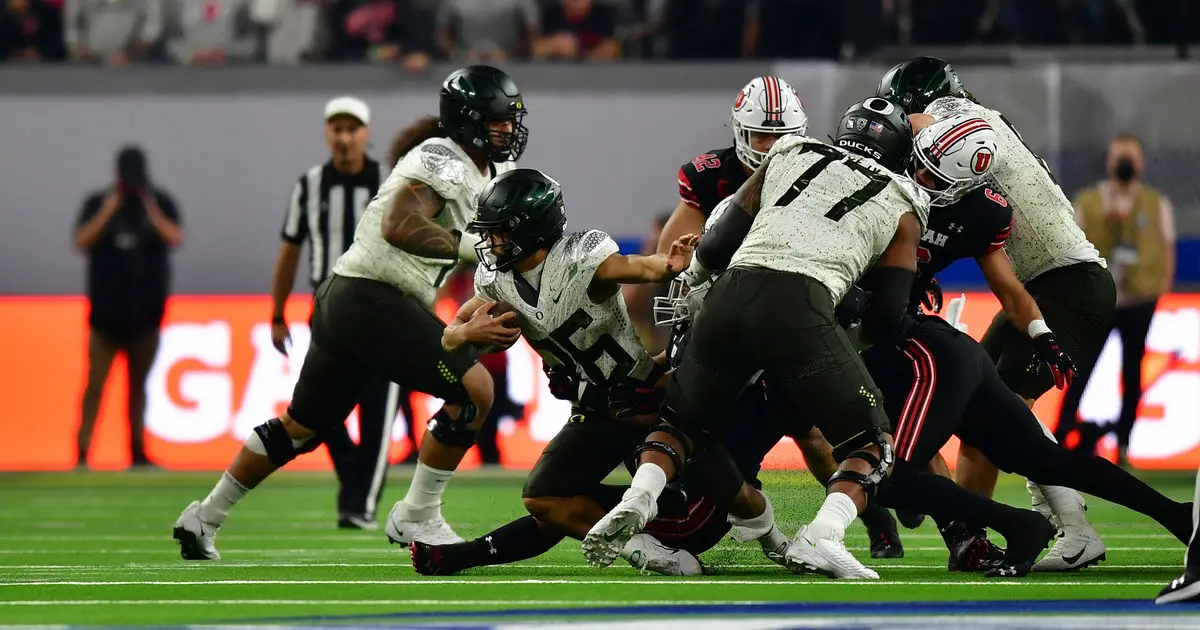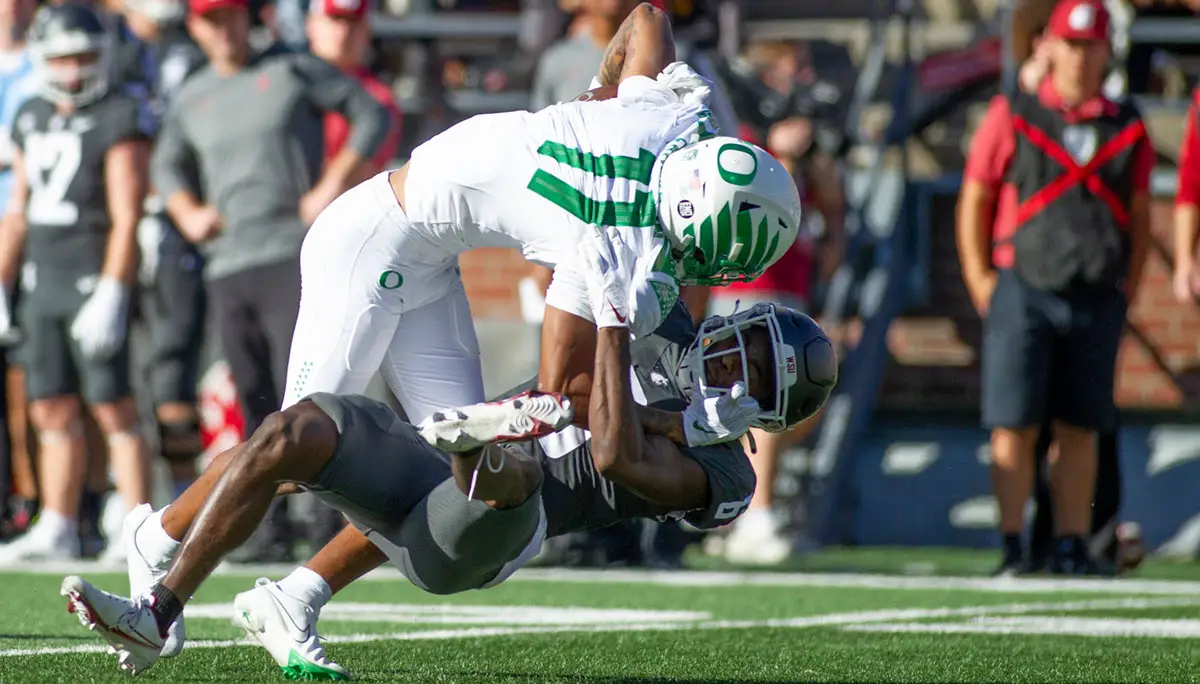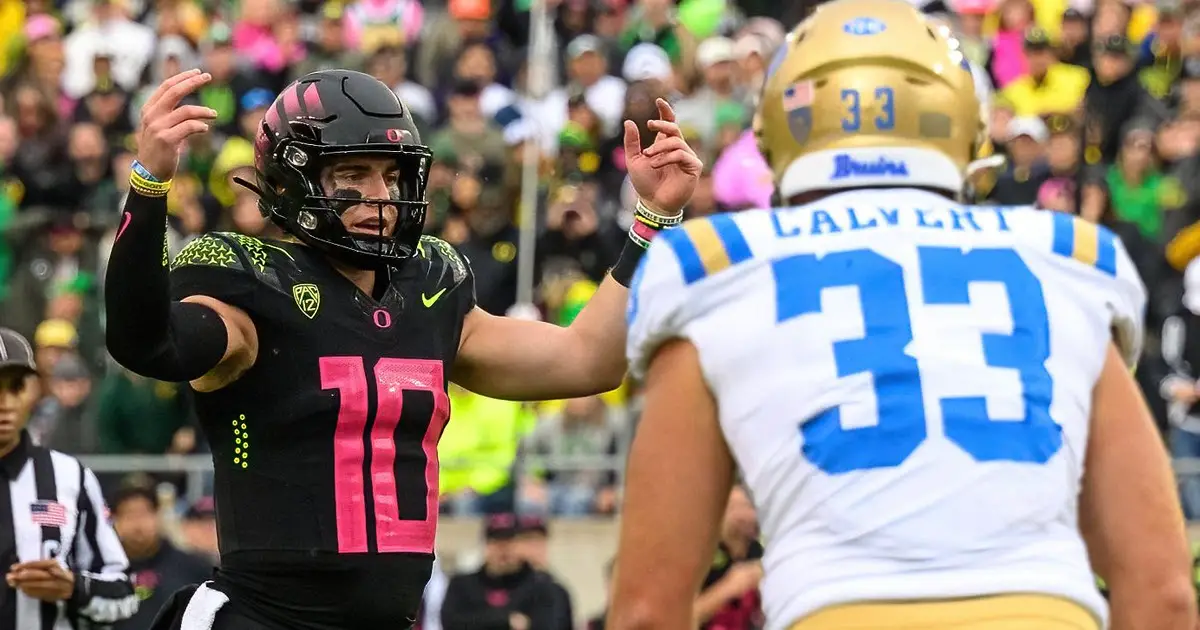As we prepare for the upcoming showdown between our Oregon Ducks and the Utah Utes at Autzen Stadium, let’s take some time to look at those dreaded 2021 beatings Oregon received. Though Oregon’s defense has left a lot to be desired this year and last year, Oregon’s offense was the real failure last year. This year is going to be different.
It may sound obvious, but Mario Cristobal is gone from Oregon and this Oregon team is a very different team than last year’s squad, even though a majority of the players are the same. Oregon will not be beaten the same way they were last year. With that said, let’s take a look at just how Utah managed to top the Ducks twice last year.
So, What Happened in 2021?
In 2021, Utah was effectively the only team that had an answer to Oregon’s offense. Oregon’s offense in Cristobal’s last year was a rush-heavy offense, so much so that the rush-pass ratio was 57% to 43%. Beyond that, Oregon’s passing offense was really just an extension of the run game: it consisted of mostly short passes that required yards to be picked up after the catch.
Beyond the composition of the offense, last year’s Ducks only averaged 31 points per game. This was not a high-powered and high-scoring offense. This year, Oregon has one of the most potent offenses in the entire country, even when you include that Georgia game where Oregon only scored 3 points.
Oregon’s offensive scheme in 2021 was to simply run the ball and challenge anyone to stop it. And as it turned out, the only team that could really stop it was Utah. Sure, Oregon lost to Stanford earlier in the year, but that game was a mess — between Oregon’s offensive coordinator Joe Moorhead being in the hospital and some mindbogglingly bad reffing at the end of the game. That game would not have been a repeatable result for Stanford. Even Ohio State couldn’t stop Oregon’s rushing offense in 2021.

Oregon’s run game last year didn’t have much running room without the threat of a vertical passing game.
But Utah figured out the key to beating Oregon. Stack the box, pin your ears back, attack downhill and overwhelm Oregon’s offensive line. On the back end, provide just enough coverage to stop any easy throws by Anthony Brown. Force Oregon to punt and then on offense, run the ball right at the Ducks and make some good passes against the Duck’s soft coverage to score points.
Then, when Brown and the Duck’s offense gets back on the field, they will be forced to score to keep up. This means that Brown will have to start throwing the ball and trying to make heroic plays to get Oregon back into the game. Brown was always at his weakest when he had to play hero-ball, and once Utah forced Brown’s hand, Brown started to make worse and worse plays. He forced passes and threw interceptions, and instead of handing the ball off during a run play, he would keep it and try to run it himself.
Oregon’s offense fell apart, and the game quickly became a disaster. Even when Oregon’s defense got a stop against Utah, it meant little as Oregon’s offense couldn’t drive the field.
Oregon did have receivers getting open, but because of the relentless Utah blitz, Brown couldn’t let the play develop and had to get rid of the ball quickly. Another issue was the part of the field where Oregon’s receivers were getting open — the middle of the field. For whatever reason, the middle of the field was a blind spot for Brown last year. There could be receivers running wide open in the middle of the field but Brown would also seem to miss them and force a pass elsewhere.
Utah took the bet that once Oregon was down on the scoreboard, they would struggle to get back in the game. Utah won that bet, as Oregon didn’t have any answers as to how to get back into the game. This was one of Cristobal’s many faults as a head coach. He was stubborn and refused to change his game plan. The way Cristobal saw it, the Ducks just needed to be more physical and allow the run game to punch through Utah’s lines, but Utah had stacked the box and was challenging Oregon to throw the ball. Oregon didn’t, or couldn’t, throw the ball, and Utah won using the same game plan twice.

Troy Franklin has been a part of a strong vertical passing attack this year, something missing from last year’s offense.
Not Again This Year
For starters, this year’s Oregon team is averaging over 10 more points per game than last year’s team. Coach Kenny Dillingham has an incredible offensive system that is putting up heaps of points and making it look almost effortless. In Bo Nix, he has the right quarterback to run this offense to its full potential. Nix is simply a better quarterback than Brown. Sure, Brown has shown he is better than his performance last year in the NFL preseason with the Baltimore Ravens, but even then, Nix is just a better and more polished player.
With Nix and an offensive line that is providing superb protection, Oregon has an excellent vertical passing game. Again, looking at last year’s game footage, you will see receivers getting open at the end of some deep routes, but Brown was just unable to get them the ball. Nix isn’t going to have a problem getting the ball to those receivers on deep routes. Oregon’s receivers are going to be able to get behind Utah’s coverage this year, as well. USC didn’t have a problem getting their athletic receivers behind Utah’s defensive backs, and Oregon shouldn’t have much of an issue either.
Oregon’s defense may still be suspect, but we are just cruising for a shootout if that’s the case. Oregon’s defense’s biggest weakness is dealing with the pass. Utah’s offense is nowhere near as pass happy as Washington’s offense, and is actually dependent on establishing the run. This gives Oregon’s defense a chance to do what it does best, though it is completely reasonable to believe Utah will be changing their game plan.
For Oregon to win, Dan Lanning is going to need a clear game plan and not get too cute. Utah is a good team and they won’t be fooled too easily. This game is probably heading for a shootout, so it will be up to Oregon’s defense to get a few stops. One thing is for sure, though: Oregon’s offense is going to put up some points.
This all does presume a healthy Nix come Saturday night. If Nix doesn’t play, then we may be in for a long night very reminiscent of last year.
David Marsh
Portland, Oregon
Top Photo By Craig Strobeck
 Andrew Mueller, the FishDuck.com Volunteer Editor for this article, works in higher education in Chicago, Illinois.
Andrew Mueller, the FishDuck.com Volunteer Editor for this article, works in higher education in Chicago, Illinois.

David Marsh is a high school social studies teacher in Portland, Oregon. As a teacher he is known for telling puns to his students who sometimes laugh out of sympathy, and being both eccentric about history and the Ducks.
David graduated from the University of Oregon in 2012 with Majors in: Medieval Studies, Religious Studies, and Geography. David began following Ducks Football after being in a car accident in 2012; finding football something new and exciting to learn about during this difficult time in his life. Now, he cannot see life without Oregon football.

